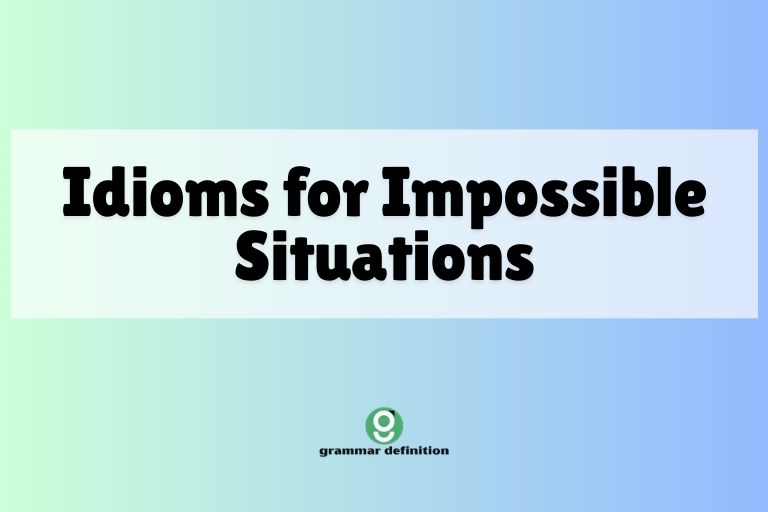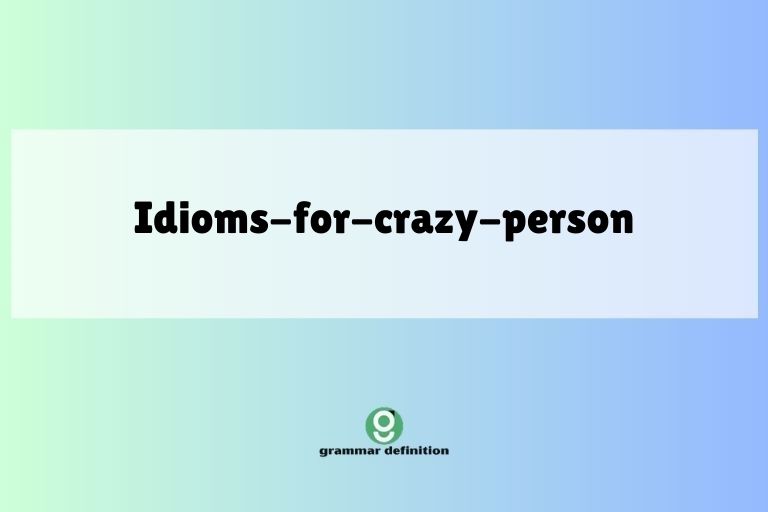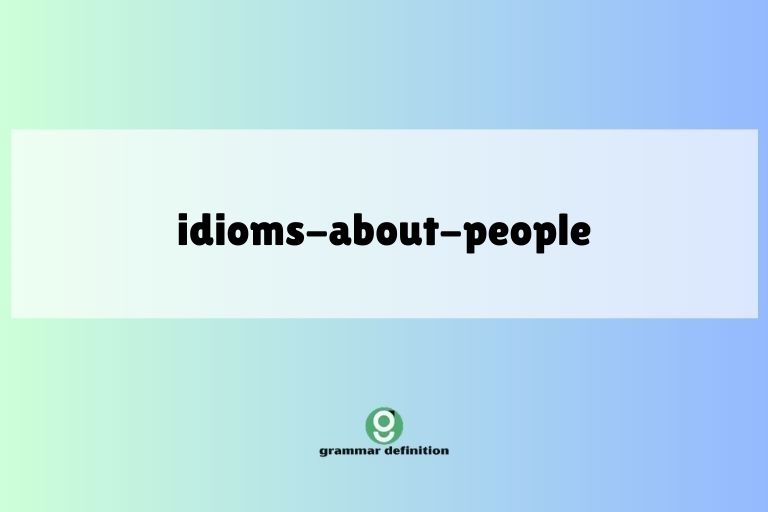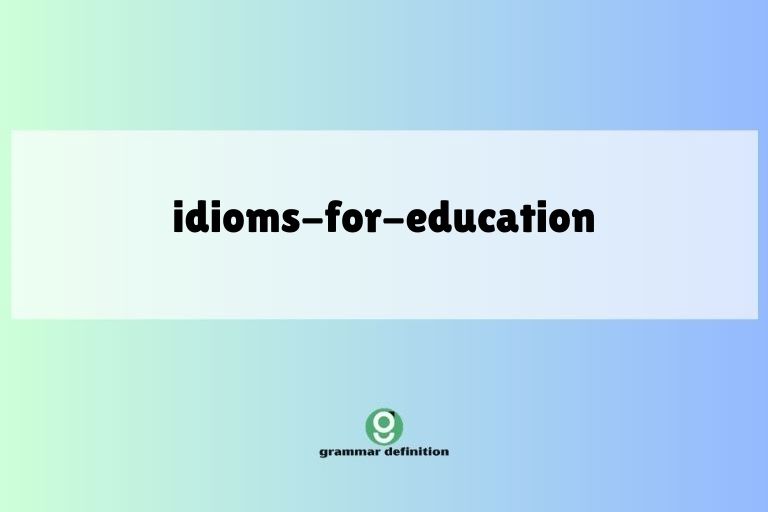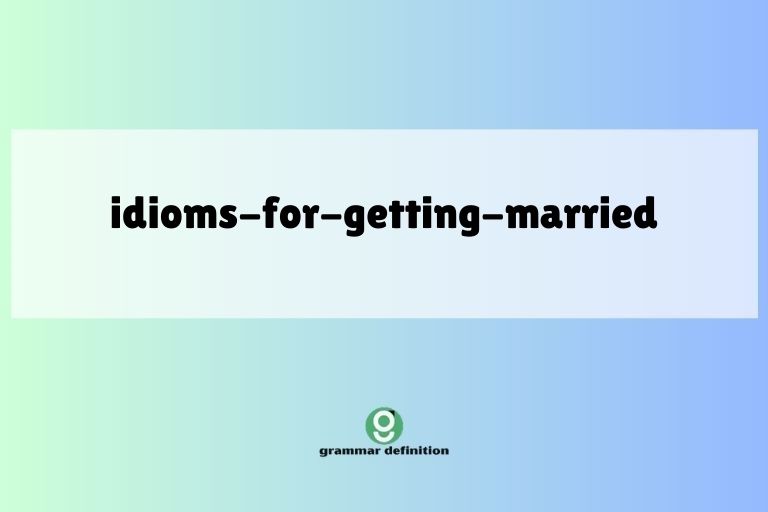Idioms for Sleep: Mastering English Sleep Expressions
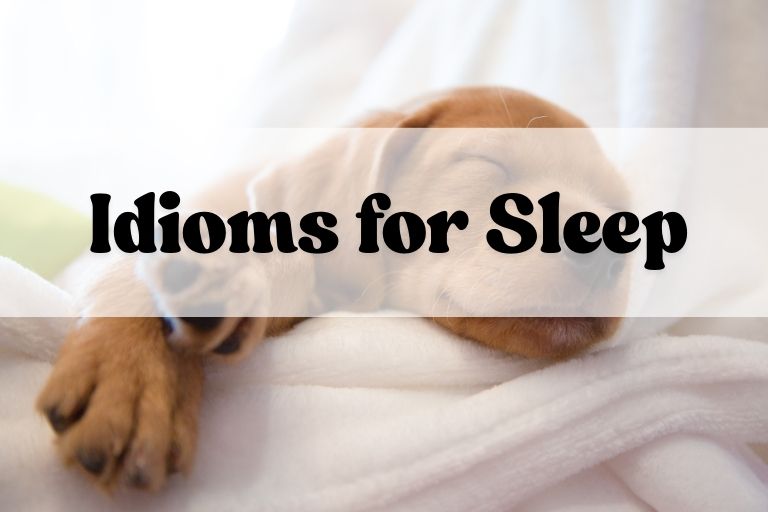
Understanding idioms is crucial for mastering English, as they add color and depth to everyday conversations and writing. Idioms related to sleep are particularly common, reflecting how central sleep is to human experience.
This article provides a comprehensive guide to idioms about sleep, designed to help English learners understand and use these expressions effectively. Whether you’re a beginner or an advanced learner, this guide will enhance your comprehension and fluency.
Table of Contents
- Introduction
- Definition of Idioms for Sleep
- Structural Breakdown
- Types and Categories of Sleep Idioms
- Examples of Sleep Idioms
- Usage Rules for Sleep Idioms
- Common Mistakes with Sleep Idioms
- Practice Exercises
- Advanced Topics in Sleep Idioms
- FAQ: Frequently Asked Questions
- Conclusion
Introduction
Idioms are an integral part of the English language, enriching communication with figurative and often humorous expressions. Sleep-related idioms capture various aspects of sleep, from its ease and depth to its absence and the resulting effects.
Mastering these idioms can significantly improve your understanding of spoken and written English, allowing you to express yourself more vividly and connect with native speakers on a deeper level. This article will explore the definition, structure, types, examples, usage rules, common mistakes, and advanced topics related to sleep idioms.
It aims to provide a comprehensive resource for English learners of all levels, enhancing their vocabulary and linguistic skills in this fascinating area of language.
Definition of Idioms for Sleep
An idiom is a phrase or expression whose meaning cannot be understood from the ordinary meanings of the words within it. Idioms relating to sleep specifically involve phrases that describe the act of sleeping, the quality of sleep, the desire for sleep, or the consequences of not getting enough sleep.
These idioms often use metaphorical language to convey nuanced meanings about rest, tiredness, and related states. Understanding idioms for sleep is essential for interpreting everyday conversations, literature, and media where these expressions are frequently used.
Recognizing these idioms helps you avoid literal interpretations, which can often lead to miscommunication and confusion.
Structural Breakdown
Sleep idioms, like all idioms, vary in their structural complexity. Some are simple phrases, while others are more complex clauses or sentences.
Many sleep idioms contain verbs related to sleeping, such as “sleep,” “doze,” or “rest.” They also frequently use adjectives to describe the quality of sleep, like “sound,” “deep,” or “light.” The structure of these idioms contributes to their figurative meaning, often relying on metaphors and similes to create vivid images related to sleep. Understanding the structural elements of sleep idioms helps learners recognize and interpret them more effectively.
The grammatical structure of these idioms can take various forms. Some common patterns include:
- Verb + Adverb: Sleep soundly
- Verb + Prepositional Phrase: Sleep like a log
- Adjective + Noun: Beauty sleep
- Complete Sentence: I could sleep for a week.
Types and Categories of Sleep Idioms
Sleep idioms can be categorized based on the aspect of sleep they describe. Here are some common categories:
1. Quality of Sleep
These idioms describe how well someone sleeps, whether it’s a deep, restful sleep or a light, disturbed one. Examples include “sleep like a log” and “not sleep a wink.”
2. Desire for Sleep
These idioms express a strong need or wish for sleep, often due to exhaustion. Examples include “I could sleep for a week” and “dead on one’s feet.”
3. Difficulty Sleeping
These idioms describe the experience of struggling to fall asleep or stay asleep. Examples include “toss and turn” and “count sheep.”
4. State of Being Sleepy
These idioms describe the feeling of being drowsy or tired. Examples include “nod off” and “heavy-eyed.”
5. Consequences of Lack of Sleep
These idioms describe the negative effects of not getting enough sleep, such as irritability or poor performance. Examples include “run on fumes” and “burn the candle at both ends.”
Examples of Sleep Idioms
Understanding idioms requires seeing them in context. The following tables provide a wide range of examples, categorized by their specific meaning.
Table 1: Idioms Describing the Quality of Sleep
This table provides idioms that describe the quality of sleep, ranging from deep and restful to light and disturbed. Each idiom is accompanied by a definition and an example sentence to illustrate its usage.
| Idiom | Definition | Example Sentence |
|---|---|---|
| Sleep like a log | To sleep very soundly and deeply. | After a long day of hiking, I slept like a log. |
| Sleep like a baby | To sleep very peacefully and soundly. | He was so tired that he slept like a baby all night. |
| Not sleep a wink | To not sleep at all. | I didn’t sleep a wink last night because of the noise. |
| Sleep soundly | To sleep deeply and peacefully. | The medicine helped her sleep soundly through the night. |
| Sleep tight | Sleep well. (Often used as a farewell.) | “Goodnight, sleep tight!” she said to her children. |
| Drift off to sleep | To gradually fall asleep. | I drifted off to sleep while reading a book. |
| Be fast asleep | To be sleeping deeply. | When I checked on the kids, they were fast asleep. |
| Dead to the world | Sleeping so deeply that one is unaware of what is happening around them. | He was so exhausted he was dead to the world. |
| Saw logs | To snore loudly while sleeping. | My roommate was sawing logs all night. |
| Sleep on it | To think about something before making a decision. | Don’t give me an answer now; sleep on it. |
| Catch some Z’s | To sleep. | I need to catch some Z’s before the big game. |
| Get forty winks | To take a short nap. | I’m going to get forty winks before we go out. |
| Lose sleep over something | To worry about something so much that it keeps you awake. | Don’t lose sleep over such a small problem. |
| Light sleeper | Someone who wakes up easily. | I’m a light sleeper, so any noise wakes me up. |
| Heavy sleeper | Someone who sleeps very soundly and is difficult to wake. | He’s a heavy sleeper; you’ll have to shout to wake him. |
| In a deep sleep | Sleeping very deeply. | She was in a deep sleep and didn’t hear the phone ring. |
| Rest your head | To sleep or relax. | You look tired; why don’t you rest your head for a while? |
| Out like a light | To fall asleep very quickly and deeply. | As soon as his head hit the pillow, he was out like a light. |
| Sleep through something | To continue sleeping despite a noise or disturbance. | I slept through the thunderstorm last night. |
| Toss and turn | To move around restlessly in bed while trying to sleep. | I was tossing and turning all night, unable to get comfortable. |
| Wide awake | Completely awake. | I drank coffee and now I’m wide awake. |
| Sleepwalking | Walking while asleep. | He was sleepwalking again last night. |
| Hit the hay | To go to bed. | I’m exhausted, I’m going to hit the hay. |
| Turn in | To go to bed. | It’s getting late, I think I’ll turn in. |
| Be up with the lark | To wake up very early. | He’s always up with the lark, even on weekends. |
| Burning the midnight oil | Working or studying late into the night. | She’s been burning the midnight oil to finish her thesis. |
Table 2: Idioms Expressing the Desire for Sleep
This table lists idioms that express a strong desire or need for sleep, often due to extreme tiredness or exhaustion. These idioms highlight how vital sleep is and the impact of its absence.
| Idiom | Definition | Example Sentence |
|---|---|---|
| I could sleep for a week | To feel extremely tired and in need of a long sleep. | After running the marathon, I could sleep for a week. |
| Dead on one’s feet | Extremely tired. | After working two shifts, I was dead on my feet. |
| Ready to drop | Extremely tired and about to collapse. | The hikers were ready to drop after their long climb. |
| Dog-tired | Extremely tired. | After the move, we were all dog-tired. |
| Beat | Very tired. | I’m beat after that workout. |
| Wiped out | Extremely tired. | I was completely wiped out after the long trip. |
| Running on fumes | To continue functioning despite being very tired or depleted. | I’m running on fumes today after only getting a few hours of sleep. |
| Sleep-deprived | Lacking the necessary amount of sleep. | Sleep-deprived parents often struggle to focus. |
| Dragging your feet | To be tired and move slowly. | I’m dragging my feet today because of lack of sleep. |
| Running on empty | Having no energy left. | She was running on empty after working the night shift. |
| Completely knackered | Exhausted (British English). | After the hike, I was completely knackered. |
| Feeling groggy | Feeling dazed, weak, or unwell, often after waking up. | I am feeling groggy after that long nap. |
| Need some shut-eye | Need to get some sleep. | I really need some shut-eye before the meeting. |
| Can hardly keep your eyes open | Extremely sleepy and struggling to stay awake. | I can hardly keep my eyes open after that heavy meal. |
| Eyes are heavy | Feeling sleepy. | My eyes are heavy, I should go to bed. |
| Zonked out | Extremely tired and quickly falling asleep. | I zonked out as soon as I got home. |
| Feeling drowsy | Feeling sleepy and ready to fall asleep. | The medicine made me feel drowsy. |
| All in | Extremely tired. | I’m all in after that workout. |
| Flat out | Very tired. | I’m flat out after that long day. |
| Sleepyhead | A person who is always sleepy or likes to sleep a lot. | Wake up, sleepyhead, it’s time for school! |
| Nap attack | A sudden, overwhelming urge to take a nap. | I had a nap attack this afternoon. |
| Hibernate | To sleep through the winter (like some animals). | I wish I could hibernate and wake up in the spring. |
| Go out like a light | Fall asleep immediately. | He went out like a light as soon as his head hit the pillow. |
| On your last legs | Close to collapsing from exhaustion. | I’m on my last legs after this long day of work. |
| Dragging yourself around | Moving with great difficulty due to fatigue. | I’ve been dragging myself around all day. |
Table 3: Idioms Describing Difficulty Sleeping
This table presents idioms that describe the experience of having trouble falling asleep or staying asleep. These expressions often convey feelings of frustration and restlessness associated with insomnia.
| Idiom | Definition | Example Sentence |
|---|---|---|
| Toss and turn | To move around restlessly in bed while trying to sleep. | I was tossing and turning all night, unable to get comfortable. |
| Count sheep | To try to fall asleep by imagining and counting sheep. | I tried counting sheep, but it didn’t help me fall asleep. |
| Stay up all night | To not go to bed at all during the night. | I had to stay up all night to finish the project. |
| Lie awake | To remain awake in bed, unable to fall asleep. | I lay awake for hours, worrying about the exam. |
| Eyes wide open | Unable to sleep. | I was lying in bed with my eyes wide open. |
| Couldn’t sleep a wink | Unable to sleep at all. | I couldn’t sleep a wink because of the noise outside. |
| Wrestling with the sheets | Tossing and turning, unable to get comfortable. | I was wrestling with the sheets all night. |
| Staring at the ceiling | Unable to sleep and looking at the ceiling. | I spent hours staring at the ceiling, unable to fall asleep. |
| Insomnia strikes | Experiencing a period of sleeplessness. | Insomnia strikes whenever I have an important event coming up. |
| Night owl | A person who prefers to stay up late and is active at night. | I’m a night owl; I do my best work late at night. |
| Burning the candle at both ends | Working or doing things from early in the morning until late at night and so getting very little rest. | He’s been burning the candle at both ends to get the project done. |
| Lost sheep | Feeling restless and unable to settle down. | I feel like a lost sheep when I can’t fall asleep. |
| Clock-watching | Constantly looking at the clock while waiting for something, such as sleep, to come. | I spent the whole night clock-watching, waiting to fall asleep. |
| Mind racing | Having many thoughts running through your head, making it hard to sleep. | My mind was racing, and I couldn’t fall asleep. |
| Restless night | A night of disturbed and uneasy sleep. | I had a restless night and woke up feeling tired. |
| Struggling to doze off | Finding it difficult to fall asleep. | I was struggling to doze off, even though I was exhausted. |
| On edge | Anxious and unable to relax. | I was on edge all night and couldn’t fall asleep. |
| Tension in your shoulders | Physical tension that prevents relaxation. | I had so much tension in my shoulders that I couldn’t relax enough to sleep. |
| Worry wart | A person who worries excessively. | I’m a worry wart, so I often have trouble falling asleep. |
| Mind buzzing | Having many thoughts or ideas going through your head. | My mind was buzzing with ideas, and I couldn’t fall asleep. |
| Chasing sleep | Trying unsuccessfully to fall asleep. | I felt like I was chasing sleep all night. |
| Eyes popping open | Waking up suddenly and unexpectedly. | My eyes kept popping open throughout the night. |
| Night terrors | Episodes of screaming, intense fear and flailing while still asleep. | He suffered from night terrors as a child. |
| Sleep paralysis | Being conscious but unable to move. | She had a frightening episode of sleep paralysis. |
| Restless legs syndrome | A condition that causes an uncontrollable urge to move the legs, especially at night. | He suffers from restless legs syndrome and has trouble sleeping. |
Table 4: Idioms Describing the State of Being Sleepy
This table includes idioms that describe the feeling of being drowsy, tired, or on the verge of falling asleep. These idioms often capture the physical sensations associated with sleepiness.
| Idiom | Definition | Example Sentence |
|---|---|---|
| Nod off | To fall asleep, usually unintentionally and briefly. | I started to nod off during the movie. |
| Heavy-eyed | Feeling sleepy; having eyelids that feel heavy. | I felt heavy-eyed after lunch and needed a nap. |
| Dozing | Sleeping lightly. | I was just dozing in my chair when the phone rang. |
| Feeling sleepy | Experiencing the sensation of wanting to sleep. | I’m feeling sleepy; I think I’ll go to bed early. |
| Groggy | Dazed, weak, or confused, especially after sleeping. | I felt groggy when I woke up this morning. |
| Sleepy as a sloth | Very sleepy and slow-moving. | I’m as sleepy as a sloth after that big meal. |
| Out on your feet | Extremely tired and about to fall asleep. | I was out on my feet by the end of the day. |
| In a daze | Feeling confused and sleepy. | I was in a daze after waking up from the nap. |
| Half asleep | Partially asleep. | I was half asleep when I answered the phone. |
| Drifting in and out of sleep | Alternating between being asleep and awake. | I was drifting in and out of sleep all night. |
| Feeling the sandman | Feeling sleepy (Sandman is a mythical figure who brings sleep). | I’m really feeling the sandman tonight. |
| Eyes drooping | Eyelids starting to close due to sleepiness. | My eyes were drooping during the lecture. |
| Brain fog | Feeling mentally unclear and sleepy. | I had brain fog all day after the sleepless night. |
| In need of a power nap | Needing a short, revitalizing nap. | I’m in need of a power nap to get through the afternoon. |
| Weary-eyed | Having tired-looking eyes. | I felt weary-eyed after the long journey. |
| Lethargic | Feeling tired and lacking energy. | I felt lethargic and didn’t want to do anything. |
| In a stupor | In a state of near-unconsciousness or insensibility. | I was in a stupor after taking the medication. |
| Snoozing | Taking a light nap. | The cat was snoozing in the sun. |
| In a slumber | Sleeping peacefully. | The village was in a peaceful slumber. |
| Waking up on the wrong side of the bed | To be in a bad mood when you wake up. | He woke up on the wrong side of the bed this morning. |
| A cat nap | A short, light sleep. | I took a cat nap this afternoon. |
Table 5: Idioms Describing the Consequences of Lack of Sleep
This table includes idioms that describe the negative consequences of not getting enough sleep, such as impaired performance, irritability, and health issues.
| Idiom | Definition | Example Sentence |
|---|---|---|
| Run on fumes | To continue functioning despite being very tired or depleted. | I’m running on fumes today after only getting a few hours of sleep. |
| Burn the candle at both ends | To work or do things from early in the morning until late at night and so getting very little rest. | He’s been burning the candle at both ends to get the project done. |
| Short-tempered | Easily made angry; irritable. | I’m short-tempered when I don’t get enough sleep. |
| Brain fog | Feeling mentally unclear and confused. | I have brain fog when I’m sleep-deprived. |
| Slow reflexes | Delayed reactions due to lack of sleep. | My reflexes are slow when I’m tired. |
| Impaired judgment | Reduced ability to make sound decisions. | Lack of sleep can lead to impaired judgment. |
| Out of sorts | Not feeling well or in a bad mood. | I’ve been out of sorts since I haven’t been sleeping well. |
| Feeling under the weather | Not feeling well. | I’m feeling under the weather because of sleep deprivation. |
| Losing focus | Having difficulty concentrating. | I start losing focus when I’m tired. |
| Grumpy | Bad-tempered and irritable. | I’m always grumpy when I haven’t had enough sleep. |
| On edge | Anxious and easily irritated. | I’m on edge when I’m sleep-deprived. |
| Zero energy | Having no energy at all. | I have zero energy when I don’t sleep well. |
| Can’t think straight | Unable to think clearly. | I can’t think straight when I’m tired. |
| Making mistakes | More prone to errors due to lack of sleep. | I start making mistakes when I’m tired. |
| Can’t function properly | Unable to perform tasks effectively. | I can’t function properly without enough sleep. |
| Suffer from fatigue | Experiencing extreme tiredness. | I suffer from fatigue when I don’t get enough sleep. |
| Can’t concentrate | Unable to focus on tasks. | I can’t concentrate when I’m tired. |
| Sluggish | Slow and lacking energy. | I feel sluggish when I don’t sleep well. |
| Zoning out | Becoming unresponsive or inattentive. | I start zoning out when I’m tired. |
| Clumsy | Awkward in movement or handling things. | I become clumsy when I’m tired. |
| Absent-minded | Forgetful or showing a lack of attention. | I’m very absent-minded when I don’t get enough sleep. |
Usage Rules for Sleep Idioms
Using idioms correctly requires understanding their specific contexts and nuances. Here are some general rules to follow when using sleep idioms:
- Context: Ensure the idiom fits the context of your sentence or conversation. Consider the formality, tone, and audience.
- Meaning: Understand the figurative meaning of the idiom and avoid literal interpretations.
- Grammar: Use the correct grammatical structure. Some idioms are fixed phrases and cannot be altered.
- Overuse: Avoid overusing idioms, as it can make your language sound unnatural or contrived.
- Audience: Be mindful of your audience. Some idioms may not be familiar to non-native speakers or people from different cultural backgrounds.
Common Mistakes with Sleep Idioms
Learners often make mistakes when using idioms. Here are some common errors and how to avoid them:
- Literal Interpretation: Interpreting idioms literally instead of understanding their figurative meaning.
- Incorrect: “I slept like a log, so I was very wooden.”
- Correct: “I slept like a log, so I slept very deeply.”
- Incorrect Grammar: Altering the structure of fixed idioms.
- Incorrect: “I could sleep for some weeks.”
- Correct: “I could sleep for a week.”
- Inappropriate Context: Using idioms in formal situations where they are not suitable.
- Incorrect: “During the board meeting, I was dead on my feet.”
- Correct: “I was extremely tired during the board meeting.”
- Misunderstanding Nuances: Failing to grasp the subtle differences between similar idioms.
- Incorrect: Using “sleep tight” in a formal email.
- Correct: Using “sleep soundly” or no idiom at all.
Practice Exercises
Test your understanding of sleep idioms with these exercises. Choose the correct idiom to complete each sentence.
Exercise 1: Fill in the Blanks
Choose the correct idiom from the list below to complete each sentence.
(sleep like a log, not sleep a wink, catch some Z’s, dead on my feet, burn the candle at both ends)
| Question | Answer |
|---|---|
| 1. After working two jobs, I was __________. | dead on my feet |
| 2. I didn’t __________ last night because of the loud party next door. | sleep a wink |
| 3. I need to __________ before the big game tomorrow. | catch some Z’s |
| 4. She’s been __________ to finish the project on time. | burning the candle at both ends |
| 5. After the long hike, I ___________. | slept like a log |
| 6. If I don’t __________, I will be exhausted tomorrow. | catch some Z’s |
| 7. He had to __________ to meet the deadline. | burn the candle at both ends |
| 8. I am so tired that I am __________. | dead on my feet |
| 9. Because of the storm, she did __________. | not sleep a wink |
| 10. The baby __________. | slept like a log |
Exercise 2: Multiple Choice
Choose the best idiom to fit the context of each sentence.
| Question | Choices | Answer |
|---|---|---|
| 1. I’m so tired; I could ______. | (a) sleep like a baby (b) sleep for a week (c) catch some Z’s | (b) sleep for a week |
| 2. She’s a ______, she’s always up working late. | (a) night owl (b) sleepyhead (c) heavy sleeper | (a) night owl |
| 3. I tried to ______, but I still couldn’t fall asleep. | (a) toss and turn (b) count sheep (c) hit the hay | (b) count sheep |
| 4. After the intense workout, he was _______. | (a) out like a light (b) ready to drop (c) wide awake | (b) ready to drop |
| 5. She ______ during the boring lecture. | (a) nodded off (b) slept tight (c) lost sleep | (a) nodded off |
| 6. He ______ after working all day. | (a) slept tight (b) nodded off (c) hit the hay | (c) hit the hay |
| 7. She is a __________, any small noise wakes her. | (a) heavy sleeper (b) sleep walker (c) light sleeper | (c) light sleeper |
| 8. When I’m tired I am __________. | (a) wide awake (b) grumpy (c) fast asleep | (b) grumpy |
| 9. I am __________, I should go to bed. | (a) caught some z’s (b) feeling drowsy (c) fast asleep | (b) feeling drowsy |
| 10. I __________when I got home. | (a) zonked out (b) couldn’t sleep a wink (c)rest your head | (a) zonked out |
Exercise 3: Sentence Completion
Complete the following sentences using an appropriate sleep idiom.
| Question | Answer |
|---|---|
| 1. Because of the stress at work, I often __________ about deadlines. | lose sleep |
| 2. The baby was __________ and didn’t wake up when the dog barked. | fast asleep |
| 3. After the long trip, all I wanted to do was __________. | rest my head |
| 4. She __________ and missed her alarm. | slept through it |
| 5. I always __________ on Sunday afternoons. | catch some Z’s |
| 6. Although I was tired, I __________ because of my anxiety. | couldn’t sleep a wink |
| 7. He had been __________ to finish his novel. | burning the midnight oil |
Advanced Topics in Sleep Idioms
For advanced learners, exploring the etymology and cultural significance of sleep idioms can provide deeper insights. Many sleep idioms have historical roots, reflecting past beliefs and practices related to sleep.
For example, the idiom “count sheep” is believed to have originated from shepherds counting their sheep before bed to ensure none were lost. Understanding these origins can add richness to your comprehension and appreciation of the English language.
Additionally, analyzing how sleep idioms are used in literature, film, and popular culture can further enhance your understanding. Authors and screenwriters often use idioms to create vivid imagery, develop characters, and convey themes related to sleep and rest.
By studying these examples, you can gain a more nuanced understanding of how idioms function in different contexts.
FAQ: Frequently Asked Questions
1. What is the difference between an idiom and a literal expression?
An idiom is a phrase whose meaning cannot be understood from the ordinary meanings of the words within it, while a literal expression means exactly what it says.
2. Why is it important to learn idioms?
Learning idioms enhances your understanding of spoken and written English, allows you to express yourself more vividly, and helps you connect with native speakers on a deeper level.
3. How can I improve my understanding of idioms?
Read widely, listen to native speakers, practice using idioms in context, and use resources like this article to learn and review common idioms.
4. Are sleep idioms universal across different cultures?
No, many idioms are culture-specific, and sleep idioms may vary significantly between languages and cultures. Understanding the cultural context is crucial for accurate interpretation.
5. Can I create my own idioms?
While it’s possible to create new expressions, idioms are generally established phrases that have gained common usage over time. It’s best to focus on learning and using existing idioms correctly.
Conclusion
Mastering idioms for sleep is an essential step in enhancing your English language skills. By understanding the definition, structure, types, examples, usage rules, and common mistakes associated with these idioms, you can significantly improve your comprehension and fluency.
Remember to practice using these expressions in context, be mindful of your audience, and continue to expand your vocabulary through reading and listening. With dedication and practice, you’ll be able to use sleep idioms confidently and effectively, adding richness and color to your communication.


